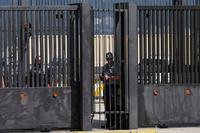Read the original article on Business Insider
A member of Russia's military intelligence spent years posing as a Brazilian citizen but was outed after tying to land an internship at the international court responsible for trying war criminals, security officials in the Netherlands said Thursday.
The man potentially posed a "very high threat" to the "security and integrity of international organizations" and was refused entry to the Netherlands in April, intelligence officials said, and sent back to Brazil.
Calling himself "Victor Muller Ferreira," the man — identified as Sergey Vladimirovich Cherkasov, a member of Russia's GRU — concocted an elaborate backstory dating back years.
A four-page biography, or "legend," that he appeared to compose, which intelligence officials said was likely from mid-2010, describes Cherkasov as being born in Rio de Janeiro. It states that he was raised by a single mother and was the product of an unplanned pregnancy. The document identifies her as a musician who died from pneumonia and was cremated (which would be convenient).
The biography, which officials said may be based in part on real events in the agent's life, includes details from childhood, including a purported crush on a geography teacher — and an explanation for why they might not share more details from their past. "I don't like to think back to these years," it states, "because my fellow pupils often used to joke about my looks and my accent."
The Russian agent was uncovered after getting an internship with the International Criminal Court at The Hague.
In March, Karim A.A. Khan, the ICC's top prosecutor, announced that he had decided to "immediately proceed with active investigations" of Russia's conduct in Ukraine, which has included multiple alleged war crimes.
If he had succeeded in gaining access as an intern, the Russian agent "would have been able to gather intelligence there and to look for (or recruit) sources, and arrange to have access to the ICC's digital systems," the service noted.
On Twitter, Eugene Finkel, a political science professor at Johns Hopkins' School of Advanced International Studies, said the man had been one of his students — and that, after graduating in 2020, he had asked for and received a letter of recommendation for a job at the ICC.
"I feel angry, I feel stupid, I feel naive, I feel tired," Finkel wrote. "I got played."











